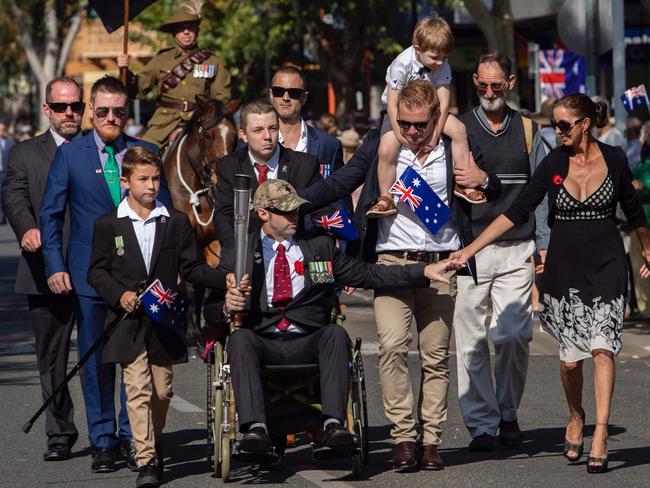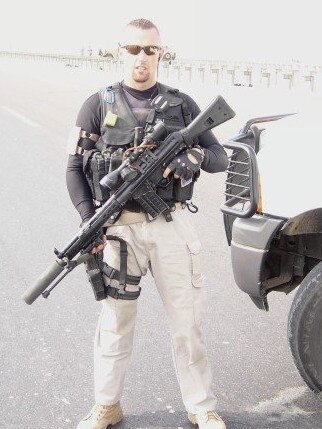Dying veteran Brad Fewson begs Defence for help to regain health
Defence has been slammed for denying veteran Brad Fewson life-saving medical treatment, with Senator Jacqui Lambie accusing the ADF of cutting him off and waiting for him to die.
NSW
Don't miss out on the headlines from NSW. Followed categories will be added to My News.
Two or three times each day, veteran Brad Fewson freezes, unable to move or speak — a frightening sight for his wife and three children, who rush to his stiffened body to resuscitate him.
Mr Fewson’s complex, terminal condition is the result of head injury and dozens of concussions during his service as a NSW police officer and his 21 years military service, including stints in East Timor and as a defence contractor in Iraq.

At 41 years old he’s spent too many months in hospital beds, in ICU and palliative care, spent weeks in a coma and been brought back to life five times.
And like so many veterans who feel shunned by their government, Mr Fewson has tried to kill himself at least 10 times.
He says the fight to get funding for the hyperbaric oxygen treatment he desperately needs is far worse than any battle on the field; he says he is being “denied, refused and stalled” treatment because it creates a precedent for veterans.
Mr Fewson, who has had Parkinson’s disease and early onset dementia since he was 35, is among the victims of a newly classed disease seen in sports players and veterans called chronic traumatic encephalopathy.

“After my team of 15 specialists all agreed, after a coma in April 2019, and a quick decline in my health, they all recommended the treatment,” he told the Sunday Telegraph.
“Department of Veteran Affairs reviewed and researched it thoroughly and approved stage one. The treatment totally gave me life beyond anyone’s expectation. The treatment began healing my brain. Then, it was suspended.
“To get a quick appreciation of the severity of the diseases, I was given six to 12 months to live since 2015.”

By September 2019 Mr Fewson had “full end-stage dementia” and was walker-bound. But after three months of oxygen treatment his brain degeneration started to reverse.
“I ran for the first time with my youngest son. Scans showed healing, medical bloods and pharmacology showed healing. We had shown how to heal a terminal condition.
“Then the DVA refused all treatment.”
Senator Jacqui Lambie warns that if the government doesn’t intervene and allow the treatment to continue once a day, five days a week, Defence will have another death on their hands.
In parliament this week she warned her colleagues to “wake up, because without this treatment you know and I know he is going to die and we’re all going to a coronial inquest, and, by God, I will not hold back on your department.
“I’ll bring the minister in. I’ll bring the secretary in … You’re all coming in. What you have done to this man and his family is beyond disgusting. It’s absolutely incompetent, and you’re killing him.”
Ms Lambie said Mr Fewson had “put his body on the line for our country and saved the lives and limbs of people and children who couldn’t protect themselves”.
“But his time in service has broken his body. The ADF broke his body.”
Mr Fewson was one of the first veterans in Australia to get hyperbaric oxygen therapy, which is approved around the globe for his condition — except in Australia.
“It keeps him alive and gives him the oxygen he needs to stay alive,” Ms Lambie said.
“He went from being completely out of it, back to being himself again. He can talk again, he can write again and he can speak words. He can say to his wife, ‘I love you.’

“But the Department of Veterans’ Affairs are not going to pay for him to get that therapy any more. They won’t pay for him to get to Melbourne so that he can have the therapy he needs to take his next breath of oxygen.
“They won’t pay for his accommodation while he gets the therapy he needs. They’ve basically cut Brad off, waiting for him to die.”
Mr Fewson has been travelling from his home in Wagga to Melbourne “week on, week off” for the past 18 months. The private clinic — sympathetic to his dire state — has been treating him free of charge. He wants a chamber in Wagga.
A single chamber that could treat 100 people a year would cost between $100,000 and $200,000.
Mr Fewson’s cost for care to DVA without the oxygen treatment or carers is in excess of $200,000 a year.
“The cost savings is huge. I could have personally bought a chamber but I’m in debt and broke doing what they insisted,” he said.
“I’ve done 21 years service to the government, bled, killed many in the battle on terrorism, dedicated my life to service of the government, to society as a police officer, in military and as a defence approved contractor and they don’t care. I can die.”
The Department of Veterans Affairs has been contacted for comment.




